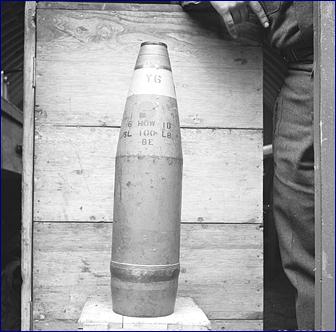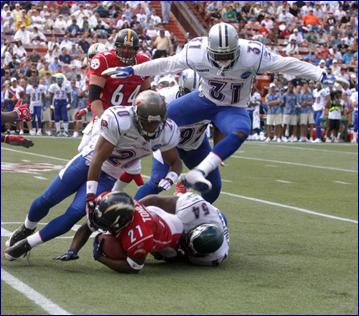XIII. Turbo-Charging Negotiation
either log in or click here to purchase.
Log in here to access video.
Haven't purchased Eye of the Storm Leadership?
Starting Point / Weapons and Sports Agents
Life imitates art, art imitates life, and both reveal deeper patterns. In the late 1990s, citizens and officials from the U.S. Department of Defense began meeting in response to mounting congressional concerns over the Army’s plans to destroy antiquated weapons. The idea was right but the method of decommissioning was in dispute. Stockpiled weapons -- old canisters of nerve and mustard gas, left over VX, and other unused explosives and corrosives -- were still dangerous and most communities wanted nothing to do with them. The fight on how to rid them lasted more than a decade. Â
 6� Howitzer Fired Chemical Weapon. Credit: NASA/Johnson Space Center
6� Howitzer Fired Chemical Weapon. Credit: NASA/Johnson Space CenterEvery negotiation is a dance. Some are tangos. Others are polkas, jitterbugs, or waltzes. Sometimes partners are in perfect sync. Other times they step on each others toes. In the 1996 film Jerry Maguire, Tom Cruise plays an up and coming sports agent. After visiting a severely injured client, Jerry has an epiphany. He writes a new mission statement for his firm, ends up losing his job, and watches as all his clients except one abandon him. Rod Tidwell (played by Cuba Gooding) is the single talented, arrogant, and ever emotional football player who decides to stick with Jerry as both of them try to remake their careers.
Jerry needs to renegotiate Rod’s contract with the Arizona Cardinals. Rod is pressuring Jerry for a high salary while the Cardinals are trying to pay him the minimum because they don’t like his attitude. In one of the most memorable scenes in the movie, Jerry confronts Rod in the locker room after a practice and pleads with Rod to lower his expectations. Ever prideful, Rod refuses and insists on getting the “kwan.� Jerry asks him what that word means and Rod tells him it’s the whole package: love, respect, community, and the dollars to go with it. “Some people,� he tells Jerry, “have the coin but they will never have the kwan.�
 Lee Steinberg is Known for his Shrewd Sports Deals. Credit: Wikimedia Commons.
Lee Steinberg is Known for his Shrewd Sports Deals. Credit: Wikimedia Commons.Since then, Steinberg has become known as a shrewd, talented, and continuously successful negotiator. Steinberg’s law firm has represented more than 150 clients ranging from Troy Aikman and Steve Young to Drew Bledsoe, Kordell Stewart, and Warren Moon. He has also worked with Fox Television, Warner Brothers Studios, ABC Entertainment, HBO, and on films such as Kevin Costner's For Love Of The Game and Oliver Stone's Any Given Sunday.
“There is a misnomer,� says Steinberg, “that destroying another person's position is an effective and practical way to negotiate. In reality, even if destroying another person's position and winning is possible, that scorched earth philosophy will lead to a broken relationship, so that one negotiation may be successful, but that likely will be the last time you can have an effective negotiation with that person. As for me, I just wish I didn't keep losing the "dishes" negotiation.�[i]
The Keystone Center’s Dialogue on Assembled Chemical Weapon Assessment, or “ACWAâ€� as it came to be called, met thirteen times over five years and produced a set of consensus-based technical alternatives to the incineration methods proposed by the Army. Since the meetings ended in 2002, these innovative methods based on water treatment have been implemented at sites in Colorado and Kentucky. The new $2 billion-plus facilities mark the first chemical weapons sites where DOD has not encountered lawsuits and extensive delays.Â
The
negotiation methods used in the chemical weapons dialogue precisely emulate
what Steinberg does in his representations of sports agents. Before entering a
negotiation, he says, he prepares hard. He clarifies, prioritizes, and dress
rehearses the considerations that will ultimately make his client happy. It’s
rarely just about the money. It’s the “kwan,� that larger set of personal goals
and satisfactions that must also be created. Moreover, Steinberg never forgets
that the other negotiator will believe in his or her reality just as strongly
as he and his client believe in theirs. Most important, he never makes a
proposal without first doing a presentation. When the proposal comes out, the
other side will have a context for it.

121Â Â Table of Interests
'We don't want to kill the golden goose. We just want to choke it by the neck until it gives us every last egg.'Â Rick Dubinsky, former head of the Air Line Pilots Association at United Airlines
 Think Like Chess, Move Like Ballet. Credit: Wikimedia Commons.
Think Like Chess, Move Like Ballet. Credit: Wikimedia Commons.
122Â Â Principles
“I do unto others what they do unto me, only worse.�   Jimmy Hoffa
|
|
This site managed with Dynamic Website Technology
from Mediate.com Products and Services |
